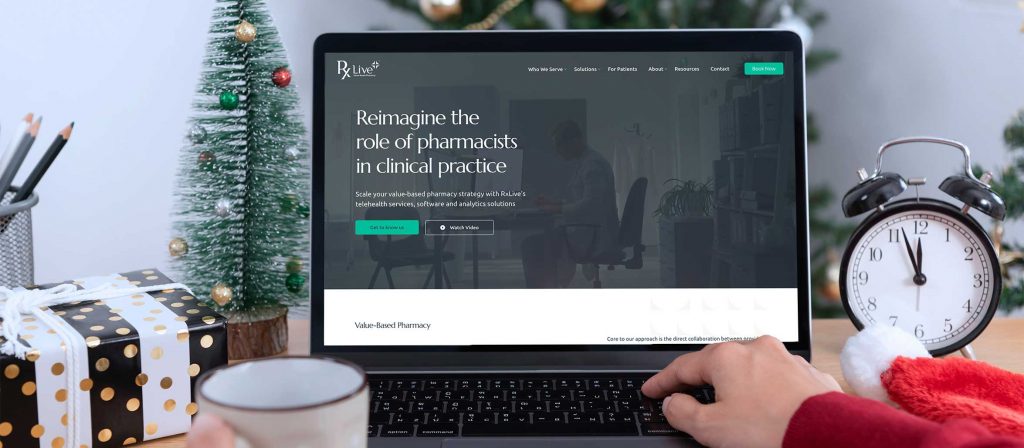Celebrating AmCare clinical pharmacy innovations and pharmacists across the country
RxLive’s focus on clinical pharmacy is powered by innovative technology and care teams dedicated to improving medication management. So how can networks as a whole lay the foundations for positive population-level health outcomes?
It starts at the top. And that means CPOs must work toward efficiently stewarding both financial and human resources.
A technology-powered pharmacy can help increase the quality of care, engage patients, lower costs, and ease the overall burden of care on every member of a healthcare team. For resource-strapped CPOs, that’s huge.
If you’d like to chat more about how RxLive can help you turn actionable knowledge into powerful pharmacy programs – or share your successes in leadership – please be in touch.
All the the best –
The Team @ RxLive
Question for the Pharmacists
Each month we will post a clinical pharmacy practice-related question. The results will be listed in next month’s edition of The Collaborative Practice. Please share your response by following the button below.
Interested in the results from last month’s question? See them below:
Last Month's question for the pharmacists:
Who did your primary patient contact for medication education at discharge?
Efficient, effective pharmacy leadership
This month we spoke with Ernie Anderson, President of Ernest R. Anderson Consulting and industry expert, about how to maintain efficient, effective pharmacy leadership that supports the best possible patient outcomes. Ernie has spent over 40 years in healthcare and offers a wealth of knowledge for pharmacy leaders.
Ernie’s topline concern? Balancing budget-consciousness with clinical necessities. “The thing I often tell CPOs is ‘follow the money,’” Ernie says. “They need to position themselves within the health system based on what’s happening at different levels. That’s difficult: you have to understand what’s happening at the broadest level, then bring it down.”
That doesn’t mean skimping on the often expensive medications critical to patient health. Rather, it means embracing a population-level view of financial management, and recognizing how to fill any corresponding educational gaps. As Ernie reminds us, “Pharmacists weren’t educated in [the finances of health systems]. But, it’s very important. You need to understand the entire system’s financial incentives to position yourself correctly.”
Of course, as is becoming a running theme in our interviews, “correct” positioning means leading a pharmacy team that understands how to prioritize your pharmacists’ bandwidth in a world of limited resources – all while holding everyone’s focus on the patients. As the financial stakes of pharmacy programs increasingly represent a larger share of health systems, navigating that balance requires a more proactive approach from leaders throughout pharmacy.
“Pharmacy has a bigger piece of the pie now,” Ernie acknowledges. “Within health systems, pharmacy is spending more money than other departments. But that requires a mental shift for CPOs: you have to be aggressive when you go to the table. You have to fight for your piece of the pie, which means you have to understand the whole picture. And I think that’s hard for a lot of pharmacists stepping into the CPO role. They’re trained pharmacists, not MBAs. They tend to be scientific, analytical types – not necessarily the kind who are comfortable being aggressive. But in this context, you have to be.”
For more, check out the first installment of our conversation with Ernie here. (And stay tuned for the second installment coming soon.)
The case for pharmacist intervention
In each edition of The Collaborative Practice, we highlight one anonymized patient case from a pharmacist in our network. The goal? Illustrate the value of pharmacist intervention and its benefit to the healthcare ecosystem. Here’s our case for this month…
Patient Case: the right dose at the right time
Recently, one of our clinical pharmacists met with a 68-year-old patient with hypertension, hyperlipidemia, Type 2 diabetes, and chronic kidney disease. Recognizing the correlation between the patient’s relatively high, 60 mg daily dose of Lovastatin and her decreased kidney function, the pharmacist recommended switching the prescription to 40 mg of Atorvastain.
As daily Atorvastatin therapy does not require any adjustment in reaction to decreased kidney function, this change in medication allows the patient to safely receive the statin dosage most appropriate for their diabetes care.
Lindsay researched the GlaxoSmithKline patient-assistance program and found that the patient may be eligible for a program that could potentially save them up to $400 per month.
Stories we’re following
From Medicare reforms to the benefits of tech-powered EHR integrations, here are five stories that currently have our attention:
The AmerisourceBergen Foundation & Good Neighbor Pharmacy launch scholarship program to support aspiring Black and African American pharmacists
A new program aims to assist Black and African American graduate students pursuing a Pharmacy Doctorate Degree. Each scholarship will provide a $100,000 total investment over a four-year Doctoral program.
Avalere: some beneficiaries could still face drug affordability issues after Part D redesign
A new study explores the impact of Medicare Part D reforms. The findings? Factors like the timing of new prescriptions mean some beneficiaries may still face affordability issues.
FDA allows access to lifesaving investigational drugs
The FDA expanded access program allows patients to be prescribed investigational drugs on the basis of treatment rather than research. Pharmacists can help educate patients on how to coordinate EA participation with providers.
How EHR integrations can tailor patient outreach for value-based care
Closing care gaps is key to value-based delivery. In the shift toward value-based care, EHR integrations can help healthcare networks reach the right patients at the right time to improve population health.
Tele-critical care pharmacists improve medication management
Research reported at the 2023 Critical Care Congress reviews how telehealth helps deliver and maintain comprehensive medication management when bedside pharmacy care is not available.
Celebrating Black History Month
February is Black History Month in the United States. And though there are a lot of podcasts and articles we could feature, we’d like to highlight Black American pioneers who changed healthcare.
In this list, Everyday Healthcare highlights the achievements of 12 trailblazing clinicians, researchers, and patient advocates who helped advance the course of medicine.




